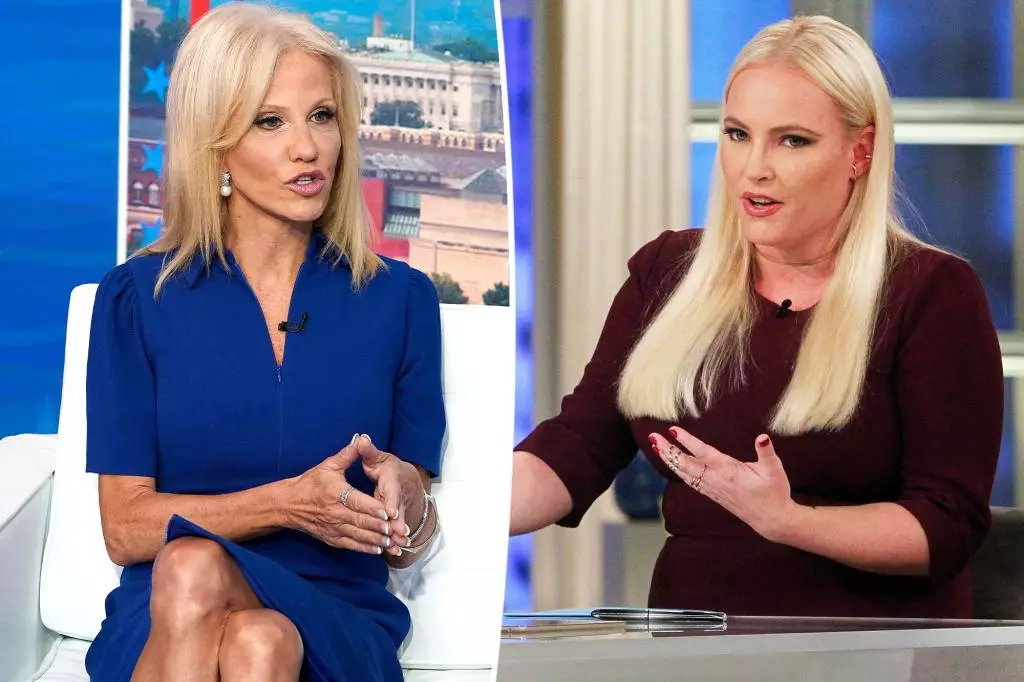In the world of political commentary and celebrity culture, confrontations are often commonplace but can reach fever pitch, particularly among strong personalities. A recent exchange between former “View” co-host Meghan McCain and Kellyanne Conway demonstrates how rapidly tensions can escalate, especially when personal feelings intertwine with public personas.
The Setting: A Women’s Summit Gone Awry
The setting for this encounter was a panel hosted by the Washington Post, part of the widely attended Women’s Summit organized by Tina Brown. On stage were prominent figures, including Conway, McCain, and 2024 DNC Convention host Minyon Moore. After their discussions wrapped up, it appeared that the atmosphere shifted from professional decorum to a more charged personal confrontation. Various eyewitness accounts paint contrasting scenarios—one portraying Conway as an aggressive critic and another depicting her as a composed and calm communicator.
This divergence in narratives underscores a vital aspect of modern discourse: the lens through which an event is viewed can greatly affect the outcome of its interpretation. This incident serves as a narrative microcosm of broader themes in contemporary society – especially regarding how feelings of defensiveness can overshadow rational dialogue.
The initial reports suggest that Conway approached McCain in a confrontational manner, expressing hurt over public remarks McCain made about Conway’s marriage to George Conway. Many claimed that Conway’s tone was anything but respectful; she allegedly chastised McCain, labeling her “disgusting” for her comments. This immediate fervor, according to some accounts, occurred in close quarters, making McCain visibly uncomfortable. She repeatedly attempted to diffuse the situation, iterating that her space was being invaded.
Yet, others paint a different picture—one where Conway approached McCain for a frontal conversation, articulating her grievances straightforwardly and rationally. In this narrative, a calmer Conway had the opportunity to explain why she found McCain’s comments inappropriate. It highlights just how influential the source’s perspective can be; those who witnessed the event had varied interpretations based on their viewpoints and biases, showcasing the deep divide in public opinion on both individuals involved.
At the heart of the confrontation lies a significant historical backdrop. Meghan McCain has a storied history tied to her late father, Senator John McCain, and his tumultuous relationship with Donald Trump. Kellyanne Conway, as a prominent figure in Trump’s administration, often found herself at the center of related political discussions. This clash didn’t merely concern McCain’s comments about Conway’s marriage; it was a collision of personal grievances and political legacies.
The reference to Trump during the exchange, with McCain imploring Conway to consider the emotional weight of her words, highlights the residual pain from the past. When McCain questioned whether Conway understood her familial pain stemming from Trump’s controversial remarks about her father, it revealed an emotional layer to what might have started as a mere professional disagreement. The insistence from Conway that “I’m not Trump! I’m not Trump!” serves not only as an immediate defense but echoes the broader struggle of public figures trying to distance themselves from previous narratives.
As accounts of the confrontation continued to flow, some witnesses noted that intervention occurred, which may have provided an exit strategy for both women caught in the heat of the moment. In high-stakes environments, sometimes it takes an external party to navigate the rough waters of personal and professional disputes, opening the door for civilized discourse—or at least removing the parties from an emotionally charged situation.
This incident exemplifies the intricate dance of personal feelings, public personas, and political affiliations. Both women are notable figures with substantial influence, and when their paths crossed at this summit, the clash was inevitable given their historical context. As we continue to observe the repercussions of their exchange, it serves as a reminder of the delicate balance between expressing one’s viewpoint and acknowledging the emotional weight carried by others—especially in a world where the personal and political often blend seamlessly.


Leave a Reply